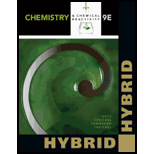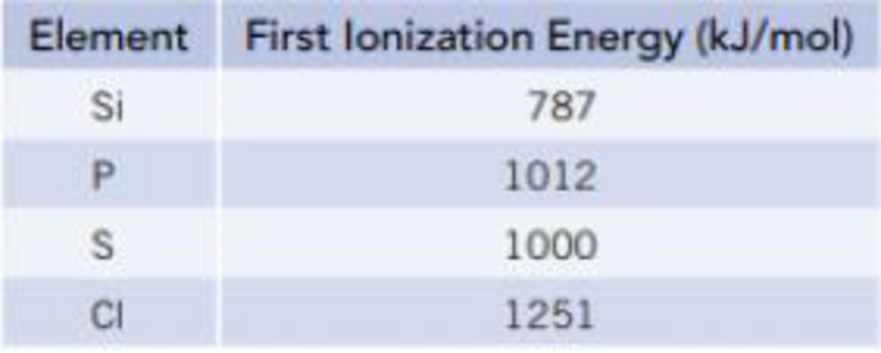
Chemistry & Chemical Reactivity, Hybrid Edition (with OWLv2 24-Months Printed Access Card)
9th Edition
ISBN: 9781285462530
Author: John C. Kotz, Paul M. Treichel, John Townsend, David Treichel
Publisher: Cengage Learning
expand_more
expand_more
format_list_bulleted
Textbook Question
Chapter 7, Problem 76SCQ
The ionization energies for the removal of the first electron in Si, P, S. and CI are as listed in the table below. Briefly rationalize this trend.

Expert Solution & Answer
Trending nowThis is a popular solution!

Students have asked these similar questions
Question 55 of 65
Submit
Write the complete ground-state
electron configuration of Cst.
For multi-digit superscripts or
coefficients, use each number in
succession.
Which requires more energy: removing a valence electron from its atom or removing an electron from an inner energy level? Explain why and give (one) an example
please dont give hand written solution
Chapter 7 Solutions
Chemistry & Chemical Reactivity, Hybrid Edition (with OWLv2 24-Months Printed Access Card)
Ch. 7.1 - How many electrons can be accommodated in the n =...Ch. 7.1 - Prob. 2RCCh. 7.2 - Based on the Aufbau principle and the n + rule,...Ch. 7.3 - (a) What element has the configuration...Ch. 7.3 - Write one possible set of quantum numbers for the...Ch. 7.3 - Using the periodic table and without looking at...Ch. 7.3 - 1. What is the electron configuration of selenium...Ch. 7.3 - 2. Based on electron configurations, which of the...Ch. 7.4 - Prob. 1CYUCh. 7.4 - Prob. 1RC
Ch. 7.4 - Prob. 2RCCh. 7.4 - Which of the following species is most...Ch. 7.5 - Without looking at the figures for the periodic...Ch. 7.5 - What is the trend in sizes of the ions K+, S2, and...Ch. 7.5 - Prob. 2RCCh. 7.6 - Give the electron configurations for iron and the...Ch. 7.6 - Prob. 2QCh. 7.6 - Prob. 3QCh. 7.6 - Prob. 4QCh. 7.6 - Prob. 1RCCh. 7.6 - Prob. 2RCCh. 7.6 - The most common oxidation state of a rare earth...Ch. 7.6 - Prob. 6QCh. 7.6 - Prob. 7QCh. 7.6 - Use the atomic radii of scandium, yttrium,...Ch. 7.6 - Prob. 9QCh. 7.6 - Prob. 10QCh. 7 - Write the electron configurations for P and CI...Ch. 7 - Write the electron configurations for Mg and Ar...Ch. 7 - Using spdf notation, write the electron...Ch. 7 - Using spdf notation, give the electron...Ch. 7 - Prob. 5PSCh. 7 - Prob. 6PSCh. 7 - Use noble gas and spdf notations to depict...Ch. 7 - The lanthanides, once called the rare earth...Ch. 7 - Prob. 9PSCh. 7 - Prob. 10PSCh. 7 - What is the maximum number of electrons that can...Ch. 7 - What is the maximum number of electrons that can...Ch. 7 - Depict the electron configuration for magnesium...Ch. 7 - Depict the electron configuration for phosphorus...Ch. 7 - Using an orbital box diagram and noble gas...Ch. 7 - Using an orbital box diagram and noble gas...Ch. 7 - Using orbital box diagrams, depict an electron...Ch. 7 - Prob. 18PSCh. 7 - Prob. 19PSCh. 7 - Using orbital box diagrams and noble gas notation,...Ch. 7 - Manganese is found as MnO2 in deep ocean deposits....Ch. 7 - One compound found in alkaline batteries is NiOOH,...Ch. 7 - Prob. 23PSCh. 7 - Arrange the following elements in order of...Ch. 7 - Prob. 25PSCh. 7 - Prob. 26PSCh. 7 - Which of the following groups of elements is...Ch. 7 - Arrange the following atoms in order of increasing...Ch. 7 - Compare the elements Na, Mg, O, and P. (a) Which...Ch. 7 - Compare the elements B. Al, C, and Si. (a) Which...Ch. 7 - Explain each answer briefly. (a) Place the...Ch. 7 - Explain each answer briefly. (a) Rank the...Ch. 7 - Identify the element that corresponds to each of...Ch. 7 - Identify the element that corresponds to each of...Ch. 7 - Explain why the photoelectron spectra of hydrogen...Ch. 7 - Sketch the major features (number of peaks and...Ch. 7 - These questions are not designated as to type or...Ch. 7 - The deep blue color of sapphires comes from the...Ch. 7 - Using an orbital box diagram and noble gas...Ch. 7 - Prob. 40GQCh. 7 - Prob. 41GQCh. 7 - Prob. 42GQCh. 7 - Which of the following is not an allowable set of...Ch. 7 - A possible excited state for the H atom has an...Ch. 7 - The magnet in the following photo is made from...Ch. 7 - Name the element corresponding to each...Ch. 7 - Arrange the following atoms in order of increasing...Ch. 7 - Prob. 48GQCh. 7 - Answer the questions below about the elements A...Ch. 7 - Answer (he following questions about the elements...Ch. 7 - Which of the following ions are unlikely to be...Ch. 7 - Prob. 52GQCh. 7 - Answer each of the following questions: (a) Of the...Ch. 7 - Prob. 54GQCh. 7 - Prob. 55GQCh. 7 - Two elements in the second transition series (Y...Ch. 7 - Prob. 57GQCh. 7 - The configuration of an element is given here. (a)...Ch. 7 - Answer the questions below about the elements A...Ch. 7 - Answer the questions below concerning ground state...Ch. 7 - Nickel(II) formate [Ni(HCO2)2] is widely used as a...Ch. 7 - Spinets are solids with the general formula M2+...Ch. 7 - The following questions use concepts from this and...Ch. 7 - Which ions in the following list are not likely to...Ch. 7 - Answer the following questions about first...Ch. 7 - The ionization of the hydrogen atom can be...Ch. 7 - Compare the configurations below with two...Ch. 7 - Prob. 68SCQCh. 7 - Write electron configurations to show the first...Ch. 7 - Prob. 70SCQCh. 7 - (a) Explain why the sizes of atoms change when...Ch. 7 - Which of the following elements has the greatest...Ch. 7 - Prob. 73SCQCh. 7 - Prob. 74SCQCh. 7 - The energies of the orbitals in many elements have...Ch. 7 - The ionization energies for the removal of the...Ch. 7 - Using your knowledge of the trends in element...Ch. 7 - Prob. 78SCQCh. 7 - Prob. 79SCQCh. 7 - Prob. 80SCQCh. 7 - Thionyl chloride. SOCl2, is an important...Ch. 7 - Prob. 82SCQCh. 7 - Slaters rules are a way to estimate the effective...
Knowledge Booster
Learn more about
Need a deep-dive on the concept behind this application? Look no further. Learn more about this topic, chemistry and related others by exploring similar questions and additional content below.Similar questions
- Consider the representations of the p and d atomic orbitals in Figs. 2-15 and 2- 17. What do the + and signs indicate?arrow_forwardThe outermost electron in an alkali-metal atom is sometimes described as resembling an electron in the corresponding state of a one-electron atom. Compare the first ionization energy of lithium with the binding energy of a 2s electron in a one-electron atom that has nuclear charge Zeff , and determine the value of Zeff that is necessary for the two energies to agree. Repeat the calculation for the 3s electron of sodium and the 4s electron of potassium.arrow_forwardThe first ionization energies of As and Se are 0.947 and 0.941 MJ/mol, respectively. Rationalize these values in terms of electron configurations.arrow_forward
- Section 11.6 uses a "firefly" analogy to illustrate how the wave mechanical modal for the atom differs from Bohr’s. model. Explain this analogy.arrow_forwardUntil recently, it was thought that Ca was unstable, and that the Ca atom therefore had a negative electron affinity. Some new experiments have now measured an electron affinity of +2.0kJmol1 for calcium. What is the longest wavelength of light that could remove an electron from Ca ? In which region of the electromagnetic spectrum does this light fall?arrow_forwardThe photoelectric effect is used today to make light-sensitive detectors; when light hits a sample of metal in a sealed compartment, a current of electrons may flow if the light has the proper wavelength. Cesium is a desirable component for such detectors. Why?arrow_forward
- Suppose that the spin quantum number did not exist, and therefore only one electron could occupy each orbital of a many-electron atom. Give the atomic numbers of the first three noble-gas atoms in this case.arrow_forwardThe following is an energy-level diagram for electronic transitions in the Bohr hydrogen atom. a. Explain why the energy levels get closer together as they increase. Provide mathematical support for this. b. Verify that the colors given in the diagram are correct. Provide mathematical support.arrow_forwardLight of very long wavelength strikes a photosensitive metallic surface and no electrons are ejected. Explain why increasing the intensity of this light on the metal still will not cause the photoelectric effect.arrow_forward
- Both the electron affinity and the ionization energy of chlorine are higher than the corresponding quantities for sulfur. Explain why in terms of the electronic structure of the atoms.arrow_forwardThe energy needed to ionize an atom of element X when it is in its most stable state is 500kJmol1 . However, if an atom of X is in its lowest excited state, only 120kJmol1 is needed to ionize it. What is the wavelength of the radiation emitted when an atom of X undergoes a transition from the lowest excited state to the ground state?arrow_forwardWhat type of electron orbital (i.e., s, p, d, or f) is designated by (a) n=3,l=1,m l =1?(b) n=5,l=0,m l =0? (c) n=6,l=4,m l =4?arrow_forward
arrow_back_ios
SEE MORE QUESTIONS
arrow_forward_ios
Recommended textbooks for you
 Chemistry: The Molecular ScienceChemistryISBN:9781285199047Author:John W. Moore, Conrad L. StanitskiPublisher:Cengage Learning
Chemistry: The Molecular ScienceChemistryISBN:9781285199047Author:John W. Moore, Conrad L. StanitskiPublisher:Cengage Learning ChemistryChemistryISBN:9781305957404Author:Steven S. Zumdahl, Susan A. Zumdahl, Donald J. DeCostePublisher:Cengage Learning
ChemistryChemistryISBN:9781305957404Author:Steven S. Zumdahl, Susan A. Zumdahl, Donald J. DeCostePublisher:Cengage Learning Chemistry: An Atoms First ApproachChemistryISBN:9781305079243Author:Steven S. Zumdahl, Susan A. ZumdahlPublisher:Cengage Learning
Chemistry: An Atoms First ApproachChemistryISBN:9781305079243Author:Steven S. Zumdahl, Susan A. ZumdahlPublisher:Cengage Learning Chemistry: Matter and ChangeChemistryISBN:9780078746376Author:Dinah Zike, Laurel Dingrando, Nicholas Hainen, Cheryl WistromPublisher:Glencoe/McGraw-Hill School Pub Co
Chemistry: Matter and ChangeChemistryISBN:9780078746376Author:Dinah Zike, Laurel Dingrando, Nicholas Hainen, Cheryl WistromPublisher:Glencoe/McGraw-Hill School Pub Co Chemistry: Principles and PracticeChemistryISBN:9780534420123Author:Daniel L. Reger, Scott R. Goode, David W. Ball, Edward MercerPublisher:Cengage Learning
Chemistry: Principles and PracticeChemistryISBN:9780534420123Author:Daniel L. Reger, Scott R. Goode, David W. Ball, Edward MercerPublisher:Cengage Learning

Chemistry: The Molecular Science
Chemistry
ISBN:9781285199047
Author:John W. Moore, Conrad L. Stanitski
Publisher:Cengage Learning

Chemistry
Chemistry
ISBN:9781305957404
Author:Steven S. Zumdahl, Susan A. Zumdahl, Donald J. DeCoste
Publisher:Cengage Learning

Chemistry: An Atoms First Approach
Chemistry
ISBN:9781305079243
Author:Steven S. Zumdahl, Susan A. Zumdahl
Publisher:Cengage Learning


Chemistry: Matter and Change
Chemistry
ISBN:9780078746376
Author:Dinah Zike, Laurel Dingrando, Nicholas Hainen, Cheryl Wistrom
Publisher:Glencoe/McGraw-Hill School Pub Co

Chemistry: Principles and Practice
Chemistry
ISBN:9780534420123
Author:Daniel L. Reger, Scott R. Goode, David W. Ball, Edward Mercer
Publisher:Cengage Learning
Quantum Numbers, Atomic Orbitals, and Electron Configurations; Author: Professor Dave Explains;https://www.youtube.com/watch?v=Aoi4j8es4gQ;License: Standard YouTube License, CC-BY
QUANTUM MECHANICAL MODEL/Atomic Structure-21E; Author: H to O Chemistry;https://www.youtube.com/watch?v=mYHNUy5hPQE;License: Standard YouTube License, CC-BY